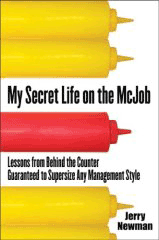
A SUNY-Buffalo Management professor went to work at low-paying McJobs (McDonald's and Burger King) and learned some valuable lessons. His new book is called
My Secret Life on the McJob: Lessons from Behind the Counter Guaranteed to Supersize Any Management Style.

Once upon a time, a Ph.D. went to work at Mickey D's and what he found was illuminating. Jerry Newman, a college professor at SUNY who has taught business courses for nearly 30 years, went undercover as a bottom-rung worker for the biggest names in fast food, including McDonald's and Burger King. Newman found that fast-food chains were the perfect petri dishes for covert research: High-pressure, high-volume businesses with high-employee turnover. The pecking order was also crystal clear, from fry cook all the way up to store manager.
He learns powerful truths about what makes businesses great… From minimum-wage floor sweepers to corner office kings, anyone with a job can learn something from Jerry Newman's experience behind the counter at major fast food restaurants. My Secret Life on the McJob reveals brilliantly simple “Supersized Management Principles” that many Fortune 500 bosses still haven't grasped.
Quite a different perspective from Joanna's
McRules!
 A SUNY-Buffalo Management professor went to work at low-paying McJobs (McDonald's and Burger King) and learned some valuable lessons. His new book is called My Secret Life on the McJob: Lessons from Behind the Counter Guaranteed to Supersize Any Management Style.
A SUNY-Buffalo Management professor went to work at low-paying McJobs (McDonald's and Burger King) and learned some valuable lessons. His new book is called My Secret Life on the McJob: Lessons from Behind the Counter Guaranteed to Supersize Any Management Style.
3 comments:
Of course he has a different perspective, he's a tourist. He went slumming, knowing that, at the end of it all, his real life is waiting for him at the end.
This is different from the average fast food employee who, at the end of the day, has only another day at the restaurant to look forward too. There is no escape for them.
yay a book for a job
A major point I bet he'll completely miss about McJobs is that they have comparatively few hidden costs to the employee that they quite easily compete in real terms with a lot of office admin jobs that people assume (as I did) will always be a step up for them.
For one thing, McD actually pays people for the hours they work. I have first-hand experience with jobs that 'pay more' at a salaried rate, and yet ultimately involve so many unpaid hours that the total amount of time would have been more efficiently spent earning minimum wage. If nothing else, the 'better' jobs tend to involve so much commuting (or living in an expensive home nearby) that many taking them will find they end up with less money per job-related hour left in the bank when the numbers are finally crunched.
McD also pays people for lunch breaks and offers them a discount on the food. I also get free coffee, which is not to bad if you add it up over the course of a year.
McD has not only never insisted that I wear expensive clothing they won't subsidize, but they actually supply the uniforms, and replace them when they wear out. This list really goes on and on. Employers who are interested in someone like me (I have an M.A.) may not realize that they need to do more than dangle some chump-change in front of me to get me to walk away from the drive-thru window. This book might be a wake-up call, but if I know the current batch of HR people like I think I do, the snooze-bar is due for a pounding.
A lot of management people tend to think McD doesn't deliver the way they do, but, just looking at the numbers, it's clear that McD at least delivers what it says it will, and that seems, sadly, to be saying a lot in today's job market.
The secret, magic lessons that this book is going to reveal to business people are probably starkly obvious to anyone who has worked at a well-run McDonalds. Among them is the simple principle of focusing on how to get the job done according to specifications, rather than on what all kinds of personal information about the employees 'means'. Where I work, people do their jobs and they let me do mine, and that seems to be all it takes. That this will come as some kind of revelation to millions of people reading the book is exactly the sad statement I wish I could better make about the state of our modern business culture.
Office HR people, consider yourselves 'served'.
Josh Broyles, M.A.; fast-food cashier
Post a Comment